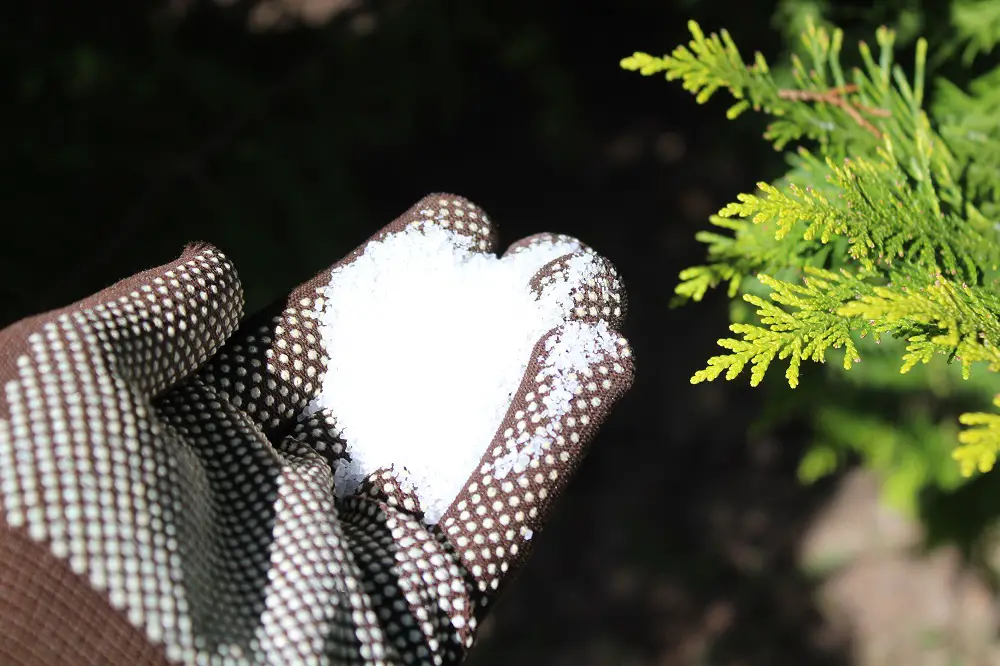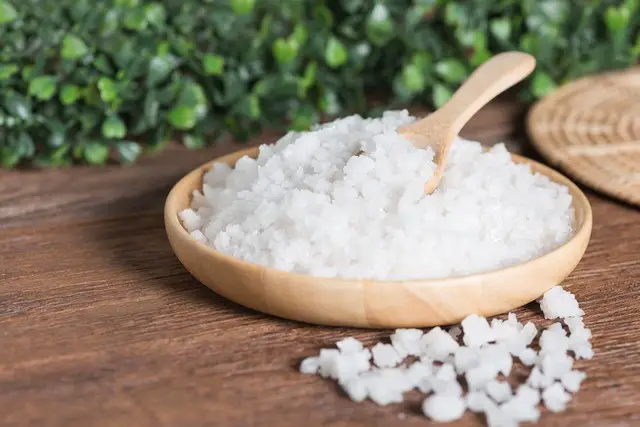Last Updated on May 17, 2022 by Grow with Bovees
It is not new news that Epsom salt is well known for its health benefits, such as; treatment of dry skin, sore muscles & joint pain.
However, it actually has several other uses in and around the home, including the fact that it is extremely beneficial for grass.
This is because it contains several minerals and nutrients that needed for the optimum health of both plants and animals/humans.
For this reason, people often use Epsom salts (Mg SO4) to create a natural fertilizer for their lawns, because, among other things it helps give you greener grass.
What Does Epsom Salt Do for Grass?
Not only does it contribute to a beautiful green lawn but Epsom salt is regarded by gardeners worldwide as an excellent multi-tasking lawn fertilizer because it can help many things from nutrient absorption, production of chlorophyll & seed germination…. to overall growth of strong blades.
It also helps to restore the color of patches of yellow grass in your garden, that look generally lackluster.
These benefits are sometimes disputed as just an urban myth because lawns and landscape plants only actually need a small amount of magnesium and sulfate.
That having been said, it is reasonably common for a lawn to have low magnesium levels (also known as a magnesium deficiency) and this mineral deficiency can either be in the plant itself or in the soil.
Fact is, the majority of gardeners proclaim the wonders of Epsom salt, not only for ensuring a lush lawn, but for other areas of the garden too.
What Other Uses Does it Have in the Garden?
Additional uses, on top of lawn maintenance, include use as an organic pest control solution and to speed up the germination of grass seeds as well as the germination of seeds for flower beds and other plants.
As well as this, adding epsom salt as a foliar spray is thought to improve color, for instance yellow leaves are often a sign of a Mg deficit, so a dose of Epsom salt will encourage new green growth, by helping to increase nutrient intake, making your shrubs fuller and with a more vibrant greener foliage.
It is no great surprise that flowers also benefit from the color enhancement.
With these claims in mind, it is no surprise that Epsom salt fertilizers are used by garden lovers and homeowners alike.
What is Epsom Salt?
Contrary to popular belief, Epsom salts are not actually related to table salt in any way.
Table salt is made from sodium chloride. The chemical makeup of Epsom salt is very different.
Another word for Epsom salt is magnesium sulfate. This is because it contains a mixture of both magnesium and sulfate. As you may know, sulfate is a mixture of oxygen and sulfur.
Does It Make the Lawn Green?
Lawn owners who put Epsom salt on lawns certainly believe so!
And there is scientific fact to back up that theory.
Why Does It Work?
Both sulfur (S)and magnesium (Mg) are important in the makeup of chlorophyll (the compound that gives leaves their green color). Their function, in this scenario, is to help the absorption of phosphorous and nitrogen.
As such, Epsom Salt is a very effective addition to your lawn fertilizer, to improve growth in your grass lawn by increasing chlorophyll production thereby making it greener.
As we said, these claims have been disputed, but so many people claim to see an improvement in their plants, soil, lawn, and garden in general that it is difficult to believe that epsom salt doesn’t do anything!
How Often Can I Use Epsom Salts for Grass?

There are a number of ways you can use this natural chemical compound to encourage lush green growth and improve the general health of your lawn.
You should use Epsom salt when you first plant the seed in your lawn, using one cup of Epsom salt per each 100 square feet of lawn. This is recommended to replenish the sulfur that is lost in the seed germination process.
To do this, you can totally drench the earth with a mixture of Epsom salts & water directly after seeding. The measurements for this are one tablespoon of salt for every gallon of water.
You can then reapply the Epsom salt solution during the growing season to avoid brown patches and to deal with yellow patches. We recommend using 1 – 2 tablespoons of Magnesium Sulfate per gallon of water to soak your lawn.
When using Epsom salt as lawn fertilizer, it is recommended that you use it in the Spring months.
You can use Epsom salt in your lawn irrigation system if you have one, or alternatively, water the lawn yourself.
A weak mixture can actually be applied monthly as part of your lawn fertilization schedule during the growing season.
I have been using it a week before I apply weed and feed for the past couple of years, and I think that it does make a difference.
Does Epsom Salt Kill Grass?
No, Epsom salt does not kill grass!
As we have illustrated above, it almost certainly offers major benefits in lawn care as it can boost its appearance, improve nutrient absorption, and help it to grow.
pH value of Mg SO4 (Magnesium Sulfate)
Epsom salt has a pretty neutral pH level of between 5.5 and 6.5, so you are unlikely to harm your lawn by adding Epsom salt in too high a quantity. Although, in hot weather, large doses can possibly stimulate weed growth.
However, it may be a good idea to do some soil tests on your whole yard to see if you have a magnesium deficiency in which case you may want to increase the dose because magnesium sulphate can be used to remedy this deficiency.
This soil test will also highlight any other deficiencies which are causing you to have a malnourished lawn.
There is lots of information out there on how to do this but we recommend taking it to a professional soil tester so that you can determine the perfect fertilizing solution for your lawn and really optimize growth rate.
Bear in mind that it is not the lawn or plant itself that needs Mg, but the soil it is planted in. Use the information from your soil pH test kit to determine how much it needs.
You can also check to see whether you might need to apply lawn lime while you are testing the soil.
Ensuring the ground has a balanced pH along with good levels of Mg and other nutrients, can help to reinvigorate your lawn as well as the other plants and shrubs in your garden. Testing the your soil PH should definitely become part of your lawn care routine.
Will Epsom Salt Kill Anything in My Garden?
Although applying Epsom salt will not kill grass, interestingly, it can be used to kill tree stumps by drilling several holes in the top of the stump and adding Epsom salt in powder form, then leaving it to dry the stump out and rot away naturally.
Epsom Salt Lawn Tonic Final Thoughts
Mix approx. 30ml of Epsom salts into one gallon of water, then spray directly over the grass. You should then use your regular lawn irrigation method to get the full benefit of epsom salt for your grass.
Apply Epsom salt solution and enjoy your lush lawn!


